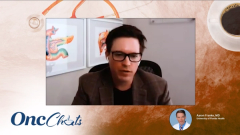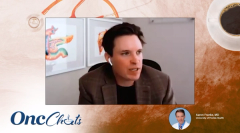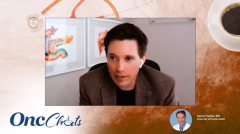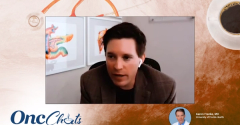
Traveling Through the Lung Cancer Treatment Paradigm: Taking Advantage of Neoadjuvant Therapy
In this third episode of OncChats: Traveling Through the Lung Cancer Treatment Paradigm, Aaron Franke, MD, discusses the expanding role of neoadjuvant therapy in non–small cell lung cancer and efforts to better identify patients who can benefit from curative-intent treatment.
Episodes in this series

In this third episode of OncChats: Traveling Through the Lung Cancer Treatment Paradigm, Aaron Franke, MD, of the University of Florida Health, discusses the expanding role of neoadjuvant therapy in non–small cell lung cancer (NSCLC) and efforts to better identify patients who can benefit from curative-intent treatment.
"One of the exciting recent evolutions [regarding] new drug approvals in a shifting paradigm that has really caught the eye and excitability of the masses, has been the incorporation of neoadjuvant therapy for the resectable NSCLC population.
In particular, an immune checkpoint inhibitor with chemotherapy in the up-front setting [is being used] to deliver higher compliance and improve overall outcomes in terms of event-free survival and ultimately, overall survival. [It is important to] remember that about 12% of newly diagnosed cancers and 20% of this mortality, is really related to the nonmetastatic setting, where about one-third of our patients present.
Despite curative-intent [approaches] with surgery and chemotherapy, plus or minus radiation, these [approaches] are not a walk in the park to go through; they still come with pretty high relapse rates. The disease-free survival really drops down to about 40% once you get closer to stage III [disease]. Even [with those who have] stage IB and II [disease, with rates of] 65% to 70%, you're still talking more than one-third of patients relapsing from their disease, almost inevitably with locally advanced or metastatic incurable disease at that point. Historically, [these patients have had] pretty poor outcomes. Again, we're talking before oncogene-driven targeted therapies and immunotherapies for the advanced space, but nonetheless, trying to improve the local setting, the curative setting to really ensure a cure is a cure when we say curative intent, or at least trying to bolster and enrich that population, should be a definite goal. We've seen the metastatic benefits of immunotherapy shift down from stage IV to then the stage III in the locally advanced space, and now, we've seen it in the adjuvant and neoadjuvant space.
Some of the caveats, just to keep in mind, is that this requires a multidisciplinary meeting of the minds, and I know that in the community, that is sometimes a little tougher if everyone is at a different institution—the surgeon, the radiation, the medical oncologist, and the pathologist, etc. It takes coordination to at least get a referral to a cancer center or local academic center to get the opinion of [if the] patient [is] a good candidate up front based on their tumor profile or molecular profile, based on the tumor characteristics. What nodal stages is it in? How likely is [the] patient to get their therapy on time [and] get to surgery? Again, we’re trying to give efficacious therapy up front that is mildly guided by biomarkers, but ultimately, histology and a small smidgen of tumor information that we have at the time. Mostly, [we’re using] clinical information from the patient, so their history and their tumor staging, to try to give the best compliance we can to a therapy to ultimately have the best pathologic outcome that will guide us hopefully as a surrogate for overall clinical outcomes.
We’re looking at pathologic complete response and clearance of circulating tumor DNA as another side product to ultimately try to decide who are the patients that benefited up front. If they did not, what we can do out back for them is still a question that remains and will be a discussion for another talk. However, right now, a clinical trial is probably [the] best option [for those patients]."
Check back next Wednesday for the next episode in this series.









































